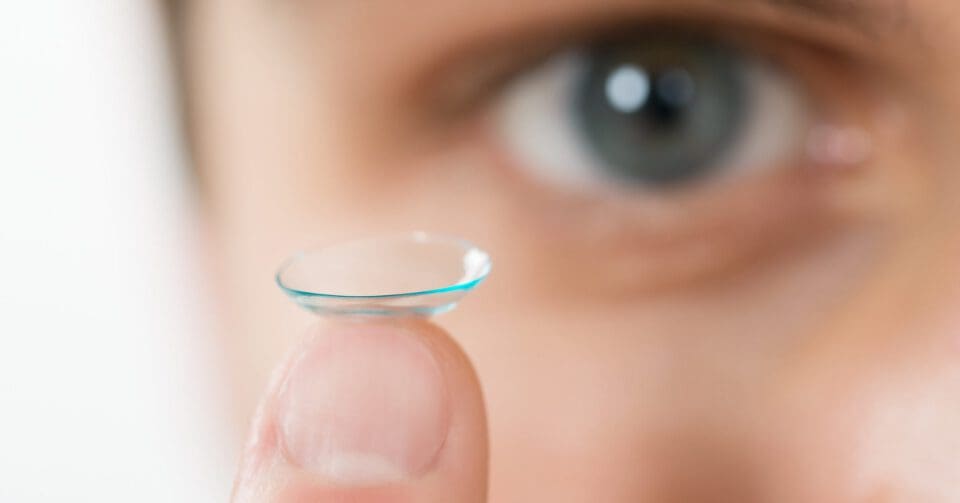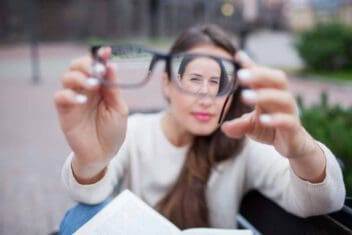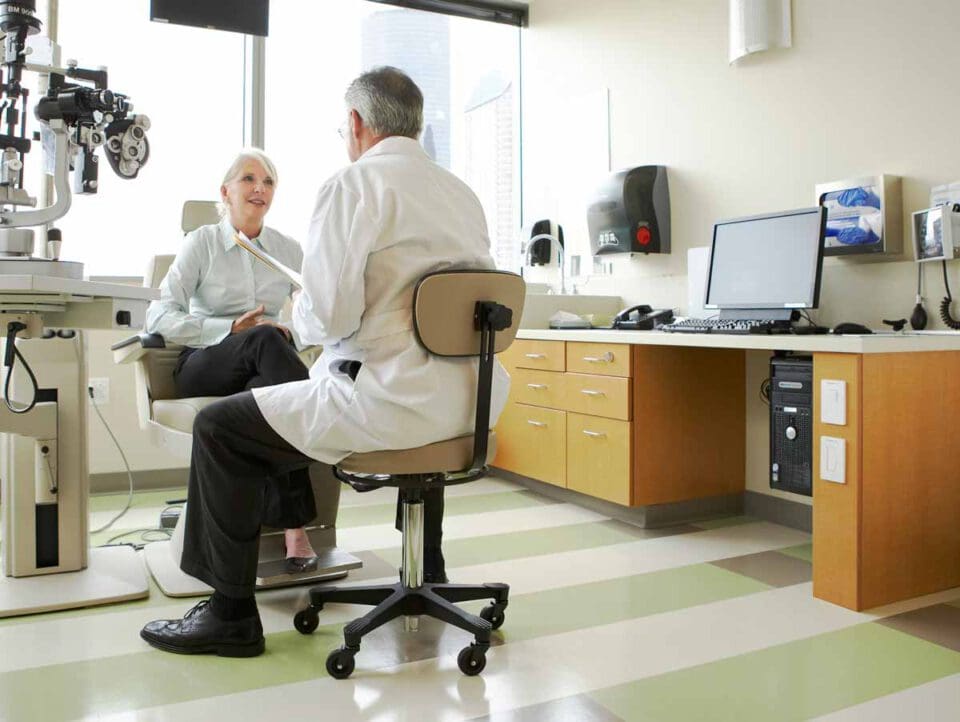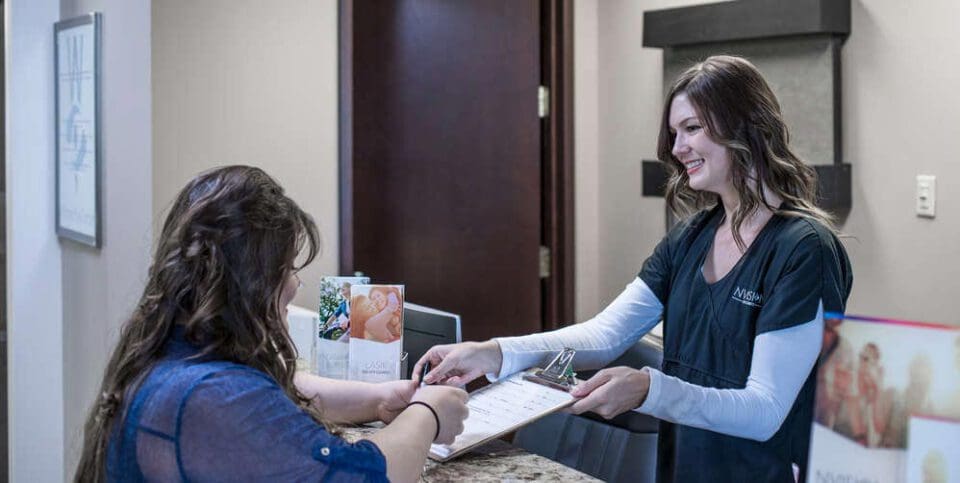How to Decide Between Contacts and Glasses: A Guide
Home / Understanding Contacts /
Last Updated:
Glasses and contact lenses can help you to deal with vision problems such as nearsightedness, farsightedness, and astigmatism. Your doctor can determine how much correction you require, and you can use that prescription to get tools that can help you to see clearly once more.
Table of Contents
Are glasses or contacts better for you? The answer relies on what you do every day, your personal preferences, and your comfort with risk.
If you are an active person or you hope to be one, you may prefer contact lenses over glasses. Contacts may also be a good choice for you if you just do not like the way glasses alter your appearance.
Contact lenses come with an enhanced risk of infection, and some forms of glasses can protect your eyes from injury and damage. Glasses are also remarkably easy to take care of, and they can be less expensive than contacts, as there is no special solution to purchase for cleaning purposes. If you do not mind the look of glasses, they could be a better choice for you.
Your eye doctor can help you decide which option is right for you. No matter which tool you select, you will need to stay in touch with your doctor to make sure your correction is appropriate.
The Benefits of Contacts

For some people, this hidden quality of contact lenses is an amazing benefit. These people may not like the way they look when they are wearing glasses, or they may not feel as though they are as attractive to others while wearing glasses as they are when they have a bare face.
Contacts can also be remarkably easy to wear even during vigorous activity. As the insurer VSP points out, contacts do not bounce around or slip from the face while people are running or jumping. As a result, people who play sports often prefer to wear contact lenses, as they are able to fully participate in the game while wearing contacts without worrying about where their glasses are.
You deserve clear vision. We can help.
With 135+ locations and over 2.5 million procedures performed, our board-certified eye surgeons deliver results you can trust. Your journey to better vision starts here.
Contacts can also be a good option for those who want to be active but haven’t managed to hit that goal quite yet. As Mayo Clinic points out, adults are encouraged to get at least 150 minutes of moderate exercise or 75 minutes of vigorous exercise every week.
Glasses are, for some people, the perfect excuse to avoid a workout. They may claim that glasses steam up when they get hot and sweat, or they may claim that glasses jiggle and move so much during a workout that they are distracting and make exercise uncomfortable. Switching to contacts could make some of these excuses fade away, and that could entice some people to grow more active and healthier.
Glasses also offer a reduced form of peripheral vision. As Scientific American points out, peripheral vision is used to help us detect subtle movement coming toward us from the sides. It’s a form of vision that was likely very helpful for our ancestors who had to run to avoid becoming prey. But this vision can also be important in some daily activities.
Driving, for example, involves peripheral vision. Seeing a subtle movement off to the side could mean the difference between hitting and avoiding an oncoming car. People who drive for a living, including school bus drivers, may rely on peripheral vision to such a degree that wearing contacts is a necessity.
The Benefits of Glasses
If you are trying to choose between glasses or contacts, consider the following points. While contacts are made for easy wear, they must also be maintained properly. They must be taken out, cleansed properly, replaced frequently, and stored appropriately. All these steps come with associated fees. People who wear contacts have cases to buy, solutions to stock, and lenses to purchase.

Glasses, on the other hand, come with no such longstanding expenses. People who choose glasses can make a one-time investment that lasts with very little need for delicate care. Cleaning of the lenses can mean little more than rinsing them with common glass cleaner, and the lenses do not need to be replaced unless vision changes. For those hoping to cut costs, glasses can be a smart choice.
Glasses also come with a lower risk of infection. Unlike contact lenses, which sit on the surface of the eye, glasses sit a bit in front of the eye and do not touch the eye at all. According to the Centers for Disease Control and Prevention, 1 in 500 contact lens wearers will have a serious eye infection that leads to blindness. People who wear glasses just do not face this risk.
Glasses can also provide protections from common issues that can harm the eye. For example, lenses can be crafted to offer protection from the damage the sun’s rays can cause, and that protection could result in a lower risk of cancerous tumors within the eye. According to the Centers for Disease Control and Prevention, some contact lenses also offer UV protection, but they are not considered a substitute for glasses. That means people with contact lenses also need to purchase sunglasses. People with prescription sunglasses get protection and vision correction in one simple investment.
Glasses can also provide at least some protection from serious eye injuries. That is the conclusion of a landmark study from 2000 published in Graefe’s Archive for Clinical and Experimental Ophthalmology. Here, researchers found that even prescription glasses, which are not designed to offer the full protection that safety glasses do, could protect people from very serious injuries that could cause vision loss. That extra bit of lens could offer enough protection to make a potentially major injury a little less severe.
Some people also like the way they look in glasses. Wearing glasses has long been associated with intelligence and seriousness, and some people wish to project those traits to the people around them. Glasses offer them a way to give that information without saying anything at all.
Glasses can also give people the opportunity to make a fashion statement. Frames come in so many shapes and sizes, and they can be swapped out when there is the desire for a new look.
Contacts vs. Eyeglasses Cost Comparison
Eyeglasses can be more cost-effective than contact lenses long-term. The average cost of eyeglasses is approximately $300. Users don’t have to replace until prescription changes. The average cost of contact lenses is approximately $50, while some can cost more.
You have to replace contact lenses monthly – sometimes even more frequently. Also, you must consider contact lens supplies such as contact solutions. It’s also necessary to see an optician annually for a new prescription. With all these factors, the annual cost of contact lenses can be twice as much as eyeglasses.
The Cost of Contact Lenses
Contact lenses can have a considerably broad price range. A lot of factors affect the price. These factors include type, brand, and specialty.
1. Daily Use Contacts
There are three main types of daily-use contact lenses:
- Daily disposable contacts
- Weekly-disposable
- Monthly-disposable contacts
Daily disposable contacts are typically sold in boxes of 30 pairs of lenses. They retail between $30 to $40 per box. You can reduce the cost of these lenses by purchasing a full-year supply.
Weekly disposable contacts are sold in boxes containing six lenses. The price of common brands ranges between $25 and $40.
Monthly disposable contacts are also sold in boxes containing six lenses. These types of contacts cost between $20 and $40.
2. Extended Wear Contacts
Extended-wear contacts are more breathable than daily use contacts and are usually more expensive. They are sold in a box containing six lenses and, depending on the brand, can cost anywhere from $45 to $75 per box.
The Cost of Glasses
Like contact lenses, the price of eyeglasses can vary considerably depending on the type of lenses or frames. According to Consumer Reports, the cheapest options have a median price of $100 while the priciest have a median price of $400.
If you choose premium features such as progressive lenses, fancy coatings, and designer frames, your prescription eyeglasses can cost considerably more. The average eyeglass wearer purchases a new pair every one or two years.
You deserve clear vision. We can help.
With 135+ locations and over 2.5 million procedures performed, our board-certified eye surgeons deliver results you can trust. Your journey to better vision starts here.
Glasses or Contacts for Covid-19
There have been claims that contacts contribute to the spread of the virus. Experts are divided on this topic. The American Academy of Ophthalmology says contact lenses can contribute to the spread of the virus, while eyeglasses provide a layer of protection against covid transmission.
On the opposing side, the American Optometric Association maintains that there isn’t any scientific evidence backing the claim that eyeglasses offer protection against covid and other viral transmissions. The organization states that wearing contacts is safe.
Nonetheless, contact lens wearers tend to touch their eyes more often. This can increase the risk of infection. Also, physicians recommend discontinuing contact lens wear if you are sick.
Overall, proper care of contact lenses and eyeglasses is vital during the pandemic. Common-sense precautions can reduce your risk of infection significantly.
Work With Your Doctor

For example, people with severe nearsightedness may need very thick glasses lenses in order to see clearly, and those heavy glasses can be uncomfortable. Contacts may serve them better. Some people with significant astigmatism may benefit from some types of contacts that reshape the surface of the eye. These contacts may be better than glasses for them. Finally, some people have very dry eyes or very vein-filled eyes, and contacts may irritate those underlying conditions. For people like this, glasses might be a better choice.
After a complete examination, your doctor can help you understand whether your prescription and eye health make glasses or contacts better for you.
If you choose contact lenses, you will need to see your doctor more frequently for follow-up care than you would if you got glasses, according to the American Optometric Association. But no matter your selection, you should visit your eye doctor frequently for dilated exams. During your exams, your doctor can look for underlying health conditions that can make your vision even worse.
We’d like to help you find an eye doctor you can trust. Contact us to find out more about the doctors in our system and learn more about how to make an appointment with the right doctor at the right time. We’re here to help.
THE PATIENT EXPERIENCE

Unparalleled Commitment
Exceptional outcomes. The gold standard in patient care. The #1 Choice of Eye Doctors®. The Vision For Life promise. That’s what makes the NVISION® experience like no other.
You deserve clear vision. We can help.
With 135+ locations and over 2.5 million procedures performed, our board-certified eye surgeons deliver results you can trust. Your journey to better vision starts here.
References
- FAQs for Prospective Contact Lens Wearers. VSP.
- How Much Should the Average Adult Exercise Every Day? (December 2018). Mayo Clinic.
- Put Your Peripheral Vision to the Test. (March 2016). Scientific American.
- Healthy Contact Lens Wear and Care: Fast Facts. (July 2018). Centers for Disease Control and Prevention.
- Healthy Contact Lens Wear and Care: Benefits of Vision Correction With Contact Lenses. (January 2015). Centers for Disease Control and Prevention.
- The Epidemiology of Serious Eye Injuries from the United States Eye Injury Registry. (February 2000). Graefe’s Archive for Clinical and Experimental Ophthalmology.
- Advantages and Disadvantages of Various Types of Contact Lenses. American Optometric Association.
- Contact Lens Cost. (June 2021). All About Vision.
- Eyeglass & Contact Lens Stores. (July 2021) Consumer Reports.
- Eye Care During Covid-19. (May 2021). American Academy of Ophthalmology.
- Covid-19 Contact Lens Fitting and Training. (2021). American Optometric Association.
This content is for informational purposes only. It may have been reviewed by a licensed physician, but is not intended to serve as a substitute for professional medical advice. Always consult your healthcare provider with any health concerns. For more, read our Privacy Policy and Editorial Policy.